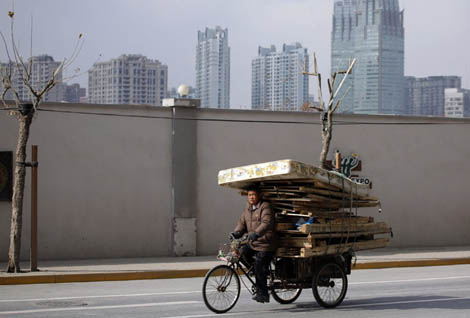Photos
Shanghai gets OK for property tax
Updated: 2011-01-11 09:37
By Wang Ying (China Daily)
|
 |
|
A man rides a tricycle cart near a construction site in Pudong district, Shanghai on Monday. Media reports in recent months suggest that China's government may impose a property tax on a trial basis in several cities, including Chongqing, Shanghai, Beijing and Shenzhen. [Photo/Agencies] |
Details not yet clear but 0.4 to 0.8 rate expected to be levied in 2011
SHANGHAI - The central government has given the city's proposal to launch a property tax the green light, and the tax is likely to begin in the first quarter of this year, sources said.
But many details still need to be worked out, according to a source close to the decision-makers.
The property tax will be a hot topic during Shanghai's "two sessions" - the National People's Congress and the Chinese People's Political Consultative Conference, due to begin on Jan 15, said Chen Sheng, deputy director of the China Real Estate Index System (CREIS), a real estate research institute.
Unlike in Chongqing, which revealed that its trial version of property tax is aimed solely at high-end properties, the Shanghai property tax could be directed at all second-home buyers or newly purchased properties whose floor space exceeds preset standards. The rate of the tax is expected to be between 0.4 and 0.8 percent.
"The most likely case is that Shanghai will impose a property tax on families that purchased new properties whose total gross floor area exceeds a certain amount. The tax rate is likely to be around 0.8 percent of the property's total value," Chen said.
James Macdonald, senior manager at Savills Research (China), said he thinks the property tax will be relatively low, as many people expect, and have a limited effect, although there may be some short-term fluctuations in transaction volumes and prices as the market readjusts to it.
| ||||
In the long term, it will help adjust the land and property market and make more efficient use of existing stock and generate a more efficient allocation of capital, he added.
Michael Klibaner, head of research for Jones Lang LaSalle China, expects that the current tight-policy footing will continue into 2011, but end-user demand for housing will remain strong.
The traditional post-Spring Festival buying period in March and April will be critical to gauge the market's direction for the whole year, he said. The housing supply will continue to increase because of government policies, helping keep prices stable, even with higher sales volumes, he said.
The government's tightening measures announced at the end of September 2010 began to take effect in the fourth quarter.
The sales volume of new commercial housing in Shanghai fell by 3 percent in October, compared with September, a traditionally busy season for home sales. New-home sales volume dropped a further 30 percent month-on-month in November as buyers reacted to the tighter regulatory environment.
"I just want to make it clear that the property tax is not a cure-all for the overheated property market, but rather an attempt to narrow the gap between the high- and low-income families, and to further adjust China's economic-growth model," said Chen from CREIS.
E-paper

Ear We Go
China and the world set to embrace the merciful, peaceful year of rabbit
Preview of the coming issue
Carrefour finds the going tough in China
Maid to Order
Specials

Mysteries written in blood
Historical records and Caucasian features of locals suggest link with Roman Empire.

Winning Charm
Coastal Yantai banks on little things that matter to grow

New rules to hit property market
The State Council launched a new round of measures to rein in property prices.




